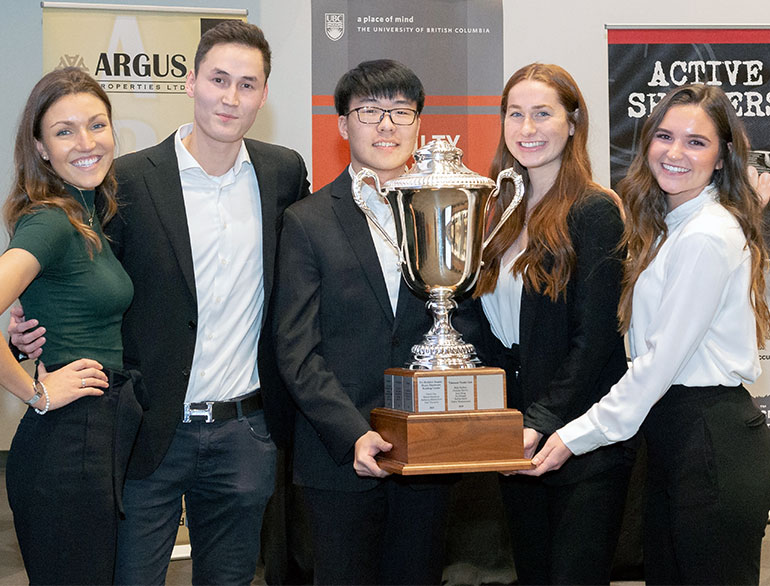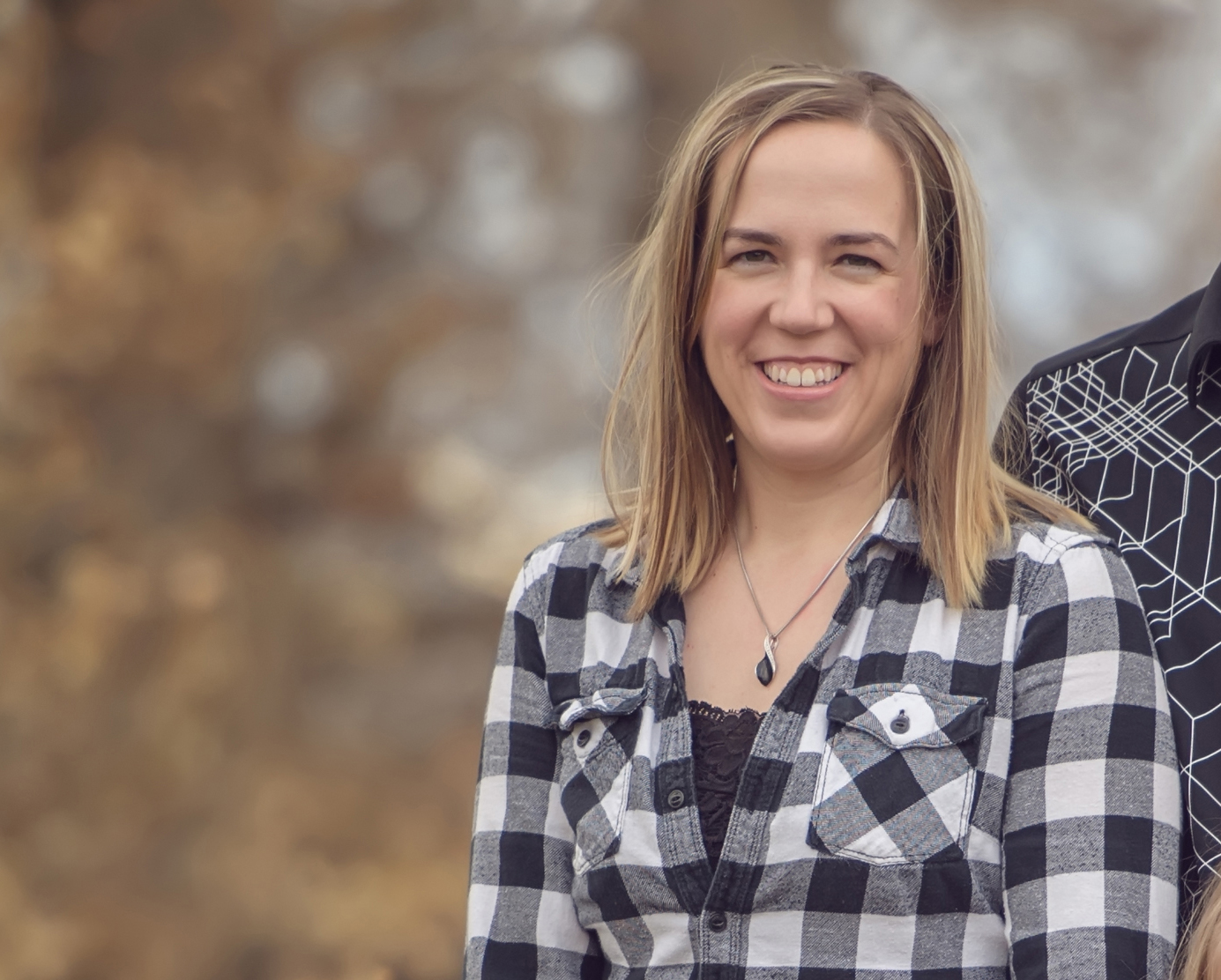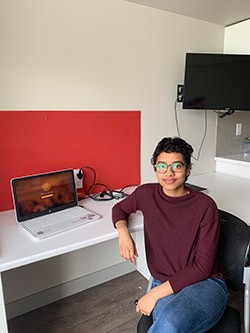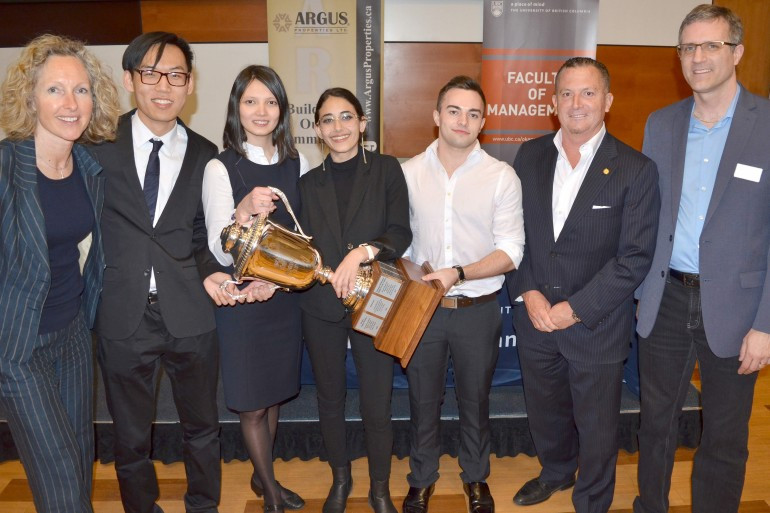
Winners of this year’s Faculty of Management Live Case Challenge (from left): Gabrielle Schroeder, Maulen Zairov, Jonathan Zhang, Breann Zilkey and Shaina Johnstone.
Ninth Live Case Challenge brings new solutions to Patriot One
UBC Okanagan students Shaina Johnstone, Gabrielle Schroeder, Maulen Zairov, Jonathan Zhang and Breann Zilkey won the ninth annual UBC Faculty of Management Live Case Challenge, an intensely collaborative learning experience that sparks new thinking about a complex business challenge.
Each year the Faculty of Management (FoM) at UBC Okanagan and partner Argus Properties Ltd. present a unique made-in-the-Okanagan opportunity—the Live Case Challenge—where 176 UBC Management students work in teams to take on an actual ‘live’ management challenge faced by a community partner. In just six weeks, students must analyze the challenge and develop innovative solutions – with only the very best of the 35 competitor teams winning the prestigious Argus Cup, a $5,000 student award and a big résumé boost.
Focused solutions
Finding a solution for the client is only the beginning of the adventure for student teams. There’s no declaring success until the teams have pitched their ideas to the judges in multiple playoff-style rounds. The judging panel is composed of professors, alumni, and partner representatives. The panel evaluates each team’s analysis, innovation and overall presentation. Just four teams compete in the final round, while the whole class and community partner look on. And only one team wins the Argus Cup and $5,000 — but all students involved in Live Case help an Okanagan business to grow, and they all take a big step toward being ready to take a UBC Management degree into a rewarding career.
After weeks of intensive research and collaboration, and a serious case of nerves while presenting their case, the winning team proudly held the Argus Cup in the air and breathed an enormous sigh of relief. Team member Shaina Johnstone is quick to point out that, “it wasn’t about the win—that’s not what we were going for, it was about the experience.”
The other winner of the night was this year’s industry participant Patriot One who benefited from the exceptional research, hard work, and unique solutions all of the teams presented. The winning team advised Patriot One to focus on consolidation of production in a Toronto facility well-placed to access the nearly $1 trillion USD safety and security market on the Eastern Seaboard, helping the company to gain market penetration sooner than previously planned. Chief Executive Officer Martin Cronin spoke with genuine enthusiasm for all of the effort students had put into their presentations: “I was delighted to support Live Case, not just as a statement of support for our partner at UBCO but for the true value that I knew it would bring. I was not disappointed. The teams brought rigour, insight and practicality to the challenge. They should all be very proud.”
For Ted Callahan, CEO of Argus Properties, Live Case is, “seeing the excitement of the students and their enthusiasm for the challenge,” that continues to inspire him year over year. “On behalf of Argus, I would like to congratulate the faculty, all the participating students, and the multitude of volunteers that all contribute to the success of Live Case. It’s an amalgam of a lot of people’s efforts and it doesn’t happen overnight. So, I’d like to congratulate everybody who’s involved.”
Detect, defer, defend: Enhancing public safety
As a self-described ‘virtual organization’ with key corporate and manufacturing elements located across Canada and the United States, and a core of top executives based in Kelowna, BC, Patriot One has developed the modular PATSCAN platform of public safety threat-detection solutions. Rather than the usual ‘security-line shuffle’ where people screened one-by-one by staff using detection devices, PATSCAN uses a low-intensity, harmless, ‘cognitive microwave radar’ easily integrated into walls and doorways. PATSCAN identifies concealed weapons, bombs and other threats in high-traffic public venues such as arena, casino and airport entry points and corridors. Security staff are alerted only when a threat is detected, saving on detection, labour time and costs, and saving people from time-consuming waits in security screening zones. Development of PATSCAN technology has drawn on the capabilities of a four-university research consortium, in which a leading role has been played by UBC’s Survive and Thrive Research (UBC STAR) initiative.
As a new, cutting-edge, publicly listed tech company entering a growing US trillion-plus dollar industry, Patriot One Technologies offered a complex and compelling business case to third-year FoM students.
Live Case Challenge is a key program element of UBC’s Bachelor of Management program, created by the Faculty of Management in partnership with and funded by Kelowna-based Argus Properties Ltd. Each year the challenge is as varied as the community partner involved – whether it’s a for-profit business, a non-profit or a municipality, each partner brings students a management challenge beyond the ordinary, demanding effective teamwork drawing on each member’s skills and abilities.
As students join their assigned team, the clock is ticking. Teams have just a few weeks to dive into the community partner’s plans and operating environment, moving from understanding through analysis to development of solutions ready for use. Partners are happy to receive the plans but the benefit flows both ways. Students learn about the challenges and opportunities of sectors they may have only seen from a distance before the Live Case Challenge, and deliver actionable recommendations that the community partner may begin to implement just moments after the challenge-winners raise the Argus Cup.
Managing the case
Students in the Faculty of Management see the Live Case Challenge as a defining moment, a time to do their best while taking carefully judged risks. Dean Roger Sugden, believes these types of challenges are, “ideal for students to learn about real challenges and real timing, yet in a safe environment—they can make mistakes, learn from mistakes, and reflect on what they do, and how they do it.” The momentum of the challenge as the weeks go by can be felt in the faculty and, “the students feed off the excitement,” says Sugden. In the Live Case Challenge, the community partner and student teams both see how abstract ideas can drive creative and critical thinking to deliver new solutions. Sugden observes: “The Live Case Challenge highlights the Faculty of Management’s fundamental belief that universities and communities have to learn how to engage with each other, learn what each other does, and what each other needs.”
About Argus Properties Ltd.
Proudly based in Kelowna, BC, Argus Properties Ltd. is a full-service, multi-department real-estate company offering a range of services, from project management, to leasing and construction.
From its inception, the Live Case Challenge partnership between UBCO FoM and Argus Properties Ltd. has tangibly delivered on the shared commitment to positively affect the Okanagan region by collaborating with and helping to develop ever-stronger and sustainable communities, businesses and organizations.
Ted Callahan, CEO of Argus Properties: “Argus is very proud to be associated with UBC and be a participant in the business community’s interaction with UBC and the Faculty of Management. We see all kinds of great benefits that are trickling down to the region, the province, and certainly into Kelowna.”
About UBC’s Okanagan campus
UBC’s Okanagan campus is an innovative hub for research and learning in the heart of British Columbia’s stunning Okanagan Valley. Ranked among the top 20 public universities in the world, UBC is home to bold thinking and discoveries that make a difference. Established in 2005, the Okanagan campus combines a globally recognized UBC education with a tight-knit and entrepreneurial community that welcomes students and faculty from around the world.
To find out more, visit: ok.ubc.ca










